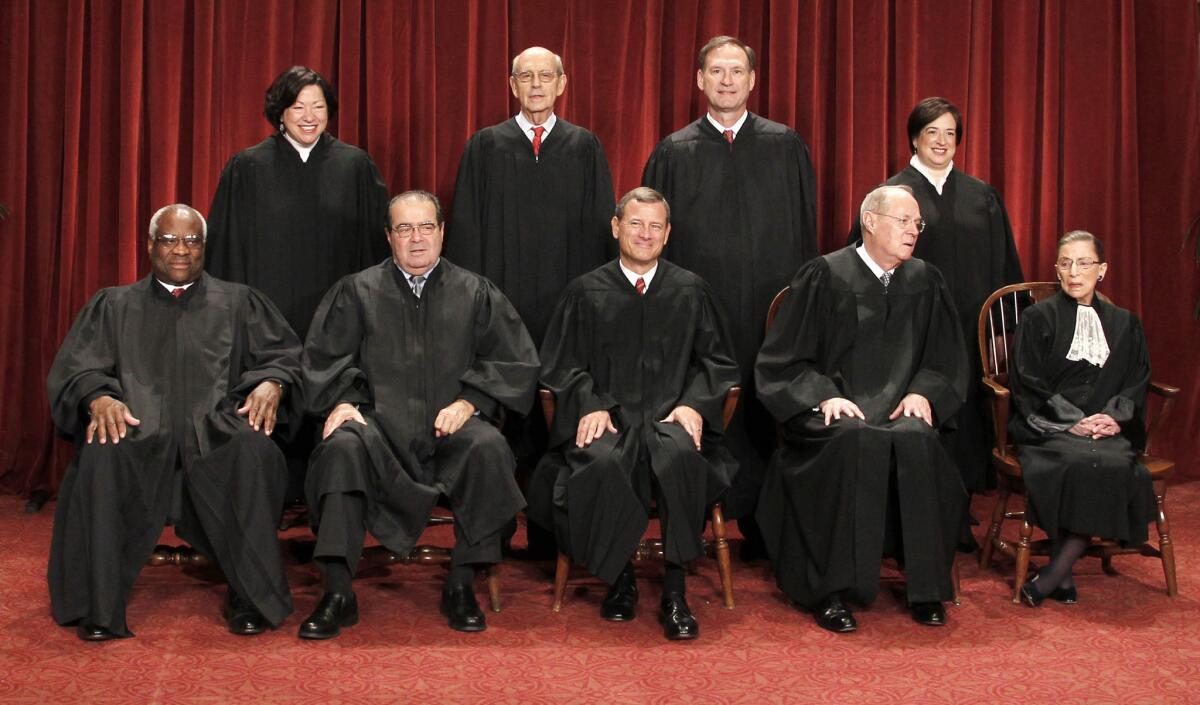U.S. Supreme Court rejects Argentina’s appeal in debt fight

- Share via
The U.S. Supreme Court has turned down a petition by Argentina to reconsider a lower-court order requiring it to pay creditors upwards of $1.4 billion.
The decision, handed down Monday without comment from the nation’s highest court, upholds a 2012 ruling that obliges the South American nation to pay all its bondholders at once — including those that have refused multiple offers to renegotiate the value of their holdings.
A group of those bondholders, led by several New York hedge funds, have repeatedly sued Argentina seeking face value on their securities. Argentina, which defaulted on nearly $100 billion of debt in 2001, has vigorously fought the claims over more than a decade. It argues, among other things, that U.S. courts lack the authority to oblige sovereign nations to pay debts.
Monday’s decision, then, is a victory for the bondholders in the dispute, and also leaves that thorny jurisdictional issue unresolved. But in a case that looks more like a pingpong match than modern jurisprudence, it is unlikely to put the dispute to rest.
In August, the U.S. 2nd Circuit Court of Appeals in New York ruled against Argentina in a separate issue in the same dispute. At the time, however, it put a stay on any action until the Supreme Court decided whether to hear the nation’s previously submitted petition.
Meanwhile, Argentina has appealed the August circuit-court ruling, and if that is rejected, the country could file a separate request to the Supreme Court. Outside observers now predict that the matter is unlikely to be resolved until the middle of next year at the earliest.
Argentina, which was able to restructure upwards of 92% of the debt on which it originally defaulted, argues that the court rulings could have a devastating effect on its economy.
Although it has enough cash to pay the $1.4 billion at stake in the legal dispute, it worries that countless other creditors — including many that already accepted lower-valued bonds in exchange for defaulted notes — would sue demanding 100 cents on the dollar. That could cost the country considerably more and, it argues, severely undermine the concept of sovereign debt restructuring.
That potential precedent has caught the attention of numerous outside interests, including the International Monetary Fund, the U.S. Treasury, France and charity groups that combat poverty.
Although Argentina’s case is exceptional because of the size of the default and the relative wealth of the country, they have argued that the rulings could have devastating effects on developing nations struggling to climb out from under crippling debt loads. The effect of the U.S. court rulings, they say, could be to embolden bondholders to refuse to negotiate and instead demand full repayment.
In particular, some claim, it could bolster the business model of hedge funds — often called vulture funds — that buy distressed debt on the secondary market at deep discount and then litigate for maximum returns. Two such funds, Elliott Management and Aurelius Capital Management, have taken the lead in the litigation against Argentina.
Argentina’s president, Cristina Fernandez de Kirchner, has maintained that the country will never pay a penny more than what it offered to the majority of creditors who accepted debt exchanges in 2005 and 2010. Those swaps reduced the value of the bonds by more than two-thirds, but Argentina has been making regular payments on them ever since.
In late August, Fernandez said that if the U.S. Supreme Court rejected the case, she would offer bondholders a third exchange, trading their bonds for new ones issued in Buenos Aires and thus skirting the authority of American courts.
ALSO:
Argentina to defy U.S. court ruling with bond plan
U.S. Court rules against Argentina in debt fight
Argentina asks Supreme Court to hear debt case
More to Read
Inside the business of entertainment
The Wide Shot brings you news, analysis and insights on everything from streaming wars to production — and what it all means for the future.
You may occasionally receive promotional content from the Los Angeles Times.










